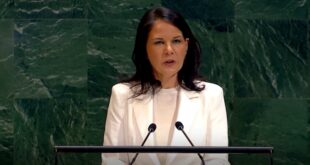Famous German humanitarian Rupert Neudeck, who died on 31 May 2016 at 77, points out what he considers the major impediments to African development in his book The strength of Africans and he explains why Western development agencies cannot be helpful to a continent that is so rich in natural resources.
In his book Die Kraft Afrikas – Warum der Kontinent noch nicht verloren ist (The strength of Africans – Why the continent is not lost yet), Rupert Neudeck contends that survival through resourcefulness is the “greatest talent” of Africans. He writes: “Any African mother or father of seven children who succeeds in supporting her/his family in the Southern Sudan locale of Sudd with only US$1 per day is undoubtedly a brilliant business manager and a strong personality.”
Neudeck co-founded the non-government organisation Cap Anamur which rose to global fame through rescuing Vietnamese refugees or “boat people” and bringing them to Germany in the late 1970s and early 1980s. He later co-founded, in 2003, an organisation called Grünhelme (Green Helmets) which is devoted to the “construction and reconstruction of infrastructures in former war and crisis areas”. The organisation has implemented projects in Rwanda, Uganda, Zimbabwe, Mauritania and Congo.
The German humanitarian seconds the view that Africa does not need development aid and that Western development agencies keep peddling the opinion of the necessity of aid to Africa only because they depend on it. The author draws upon his experience as refugees’ rescuer and development agent in Africa and elsewhere and upon the views of Thomas Scheen, Africa correspondent of the right-of-centre leaning daily Frankfurt Allgemeine Zeitung, to show that Africa does not need development aid.
Neudeck and Scheen question the statistics which at times report that most people in Africa live on less than $1 a day. They reason that if millions of Africans on the continent can afford a mobile phone, if they can spend $12 to 20 per month to use that phone, it is false to purport that they cannot afford $1 every day.
Neudeck argues that it is true that Africa is in a sorry state, but the continent cannot be restored by foreign development agencies or by foreign diplomats and politicians because these institutions and people are only acquainted with “conference reality”. They do not know the “African idiosyncrasy”.
Only African rulers and officials can sort out the scourge of poverty in Africa by refraining from embezzling the resources of their respective countries and by creating the conditions that would enable their fellow citizens to use their talents and resourcefulness to bring about development. He believes that current African rulers and officials ought to take their a cue from Steve Biko, Thomas Sankara and Nelson Mandela.
Broadly speaking, the thesis and analyses of Neudeck are valid. However, he neglects to tell the reader – as former ZDF journalist Albrecht Heise has explained time and again – that the corrupt, greedy and lazy rulers of African countries often operate in cahoots with non-African foreign powers, companies and public figures to relieve African masses of their resources and to enhance the economies and well-being of non-African countries and peoples.
Mathias Ntep
 THE AFRICAN COURIER. Reporting Africa and its Diaspora! The African Courier is an international magazine published in Germany to report on Africa and the Diaspora African experience. The first issue of the bimonthly magazine appeared on the newsstands on 15 February 1998. The African Courier is a communication forum for European-African political, economic and cultural exchanges, and a voice for Africa in Europe.
THE AFRICAN COURIER. Reporting Africa and its Diaspora! The African Courier is an international magazine published in Germany to report on Africa and the Diaspora African experience. The first issue of the bimonthly magazine appeared on the newsstands on 15 February 1998. The African Courier is a communication forum for European-African political, economic and cultural exchanges, and a voice for Africa in Europe.





















